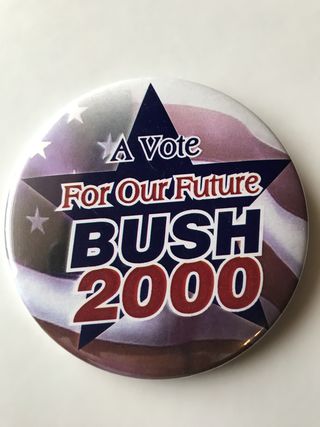Memory
Psychology in the Life of George W. Bush
Memory: Examples of psychological principles in the autobiography of George W.
Posted April 1, 2019

Given that psychology is the scientific study of mental processes and behavior (thoughts, behavior, and cognition), any autobiography is full of examples of psychological principles in action. I highlight such examples in my “Psychology in the Life of…” series.
George W. Bush was President of the United States from 2001-2009, and published his autobiography Decision Points in 2010. It was sufficiently proximal to his term to detail his thought processes, yet it was before the post-2016 public hysteria that seems to have tainted the interpretation of all U. S. politics. Indeed, a clear-eyed reading of Decision Points reminds us that U.S. politics have always been a winner-take-all blood sport, and that James Comey, Robert Mueller, and Brett Kavanaugh were relevant before the post-2016 hysteria. Reading about the character of these three men through President Bush’s eyes from before the media madness is an interesting exercise.
In Decision Points, Bush described his decision processes for selecting running mates, cabinet members, etc., as well as his thoughts on his leadership behaviors. But beyond the general psychological themes of decision making and leadership, there were specific instances that described various other principles of psychology. This article examines some of the instances related to memory.
Subconscious. Much of our cognition occurs without our awareness (Bargh & Chartrand, 1999; Dijksterhuis & Nordgren, 2006; Mather & Romo, 2007), and implicit memories occur without awareness (Schacter, 1987; Schwartz & Reisberg, 1991). In describing his first speech after the World Trade Center attacks on September 11th, 2001, Bush noted that he had said “Terrorism against our nation will not stand” when he spoke instead of the written text which was “Terrorism against America will not succeed.” The spoken line was similar to his father’s (George H. W. Bush) line of “this aggression will not stand” when Saddam Hussein invaded Kuwait. Bush noted “Dad’s words must have been buried in my subconscious, waiting to surface during another moment of crisis” (Bush, 2010, p. 128).
Flash bulb memories. Flashbulb memories are long-term memories of emotionally significant events that are stored in great detail (Squire & Kandel, 2009). On September 20th, 2001, Bush identified the 9/11 terrorist attacks as a flashbulb memory for citizens. “Each of us will remember what happened that day, and to whom it happened. We’ll remember the moment the news came—where we were and what we were doing” (Bush, 2010, p. 193).
Counterfactuals. Counterfactuals occur when someone mentally changes aspects about their past, such as “what if…” (Medvec et al., 1997). Also of note were the examples of counterfactuals that Bush provided. He wished he would have pushed for the Governor of Louisiana and Mayor of New Orleans to evacuate New Orleans sooner in advance of Hurricane Katrina. One thing he would have done differently during the federal response was to have landed at the airport in Baton Rouge, which would have changed nothing about the government’s response but would have been a morale booster, showing that the President cared. He regretted that his empathy and concern were not captured in the public account of events. Another counterfactual from Katrina, he regretted not sending in federal troops three days earlier to assist with the law enforcement response. He had not had the legal jurisdiction to do so, and the Governor of Louisiana had opposed federal troops helping to secure the city. Bush eventually sent troops in anyway, but the damage of waiting had already been done.
Bush also said that he wished he had pushed immigration reform as the first major initiative of his second term instead of Social Security reform. Additionally, he regretted that the “Mission Accomplished” banner was flying when he landed on the USS Abraham Lincoln, unbeknownst to him. The message implied that operations in Iraq were concluding, but the content of his speech explained that much work was left to be done. Unfortunately, the banner overshadowed the content of his speech.
In each of these cases of counterfactuals, Bush laid out in detail specific reasons why he thought the events would have been handled better.
Overall comments on memory. In the introduction, Bush noted that some portions of his writings relied more heavily on his memory than other more externally verifiable contents of the book, and he noted that he was responsible for any inaccuracies of his memory. In the epilogue, Bush commented that his decisions will ultimately be analyzed by historians, just as other presidencies are judged in a larger context after the fog of emotion have lifted and decisions can be analyzed for their outcomes. In doing so, he acknowledged the fallibility and limitations of human memory.
References
Bargh, J. A., & Chartrand, T. L. (1999). The unbearable automaticity of being. American Psychologist, 54, 462-479.
Bush, G. W. (2010). Decision points. New York: Crown.
Dijksterhuis, A., & Nordgren, L. F. (2006). A theory of unconscious thought. Perspectives in Psychological Science, 1, 95-109.
Mather, R. D., & Romo, A. (2007). Automaticity and cognitive control in social behavior. Southlake, TX: Fountainhead.
Medvec, V. H., Madey, S. F., & Gilovich, T. (1995). When less is more: Counterfactual thinking and satisfaction among Olympic medalists. Journal of Personality and Social Psychology, 69, 603-610.
Schacter, D. L. (1987). Implicit memory: History and current status. Journal of Experimental Psychology: Learning, Memory, and Cognition, 13, 501-518.
Schwartz, B., & Reisberg, D. (1991). Learning and memory. New York: W. W. Norton.
Squire, L. R., & Kandel, E. R. (2009). Memory: From mind to molecules (2nd ed.). Greenwood Village, CO: Roberts & Company.




